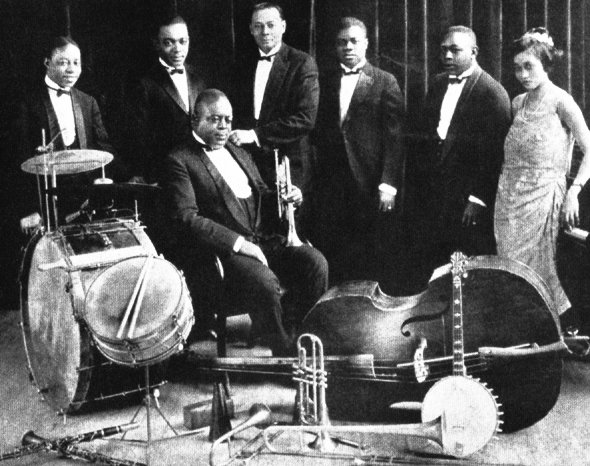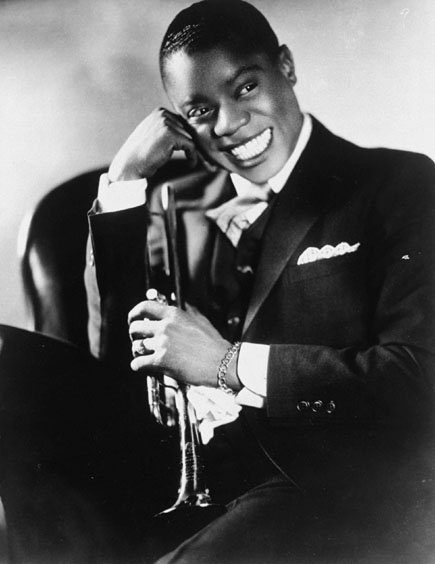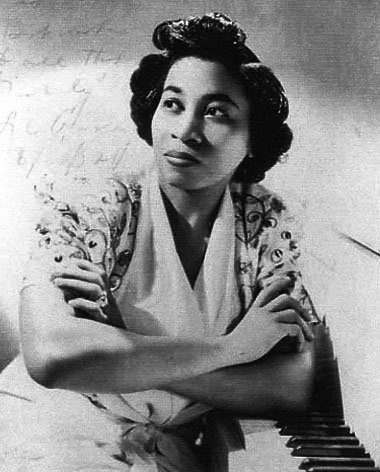King Oliver’s Creole Jazz Band: King Oliver y Louis Armstrong (corneta), Johnny Dodds (clarinete), Honore Dutrey (trombón), Lillian Hardin (piano), Bill Johnson (banyo) y Baby Dodds (batería) (1923).
En 1923 Louis Armstrong hizo una gira con la King Oliver’s Creole Jazz Band por el Medio Oeste, y al llegar a Richmond (Indiana), debutaron para la Gennett Records con nueve temas. El conjunto trabajaba en equipo con todos los miembros tocando a la vez sin producir una sensación de caos, y el clarinete, las cornetas y el trombón desarrollaban su propia línea melódica en forma de improvisación colectiva o contrapunto espontáneo. En este contexto, el clarinete tocaba figuras complejas de digitación rápida, las cornetas se movían en el registro medio tocando melodías menos elaboradas, pero impulsando al grupo, y el trombón tocaba en el registro inferior aportando las líneas de bajo.
In 1923 Louis Armstrong toured the Midwest with the King Oliver’s Creole Jazz Band, and upon arrival in Richmond, Indiana, they made their debut for Gennett Records with nine tracks. The ensemble worked as a team with all the members playing at once without creating a sense of chaos, and the clarinet, cornets and trombone developed their own melodic line in the form of collective improvisation or spontaneous counterpoint. In this context, the clarinet played complex and fast-fingering figures, the cornets moved in the middle register playing less elaborate melodies, but driving the group, and the trombone played in the lower register providing the bass lines.

De pie, tercero empezando por la derecha, Louis Armstrong.
Joe «King» Oliver concebía el jazz como una música en la que los instrumentos eran interdependientes y su Creole Jazz Band fue la mejor en este estilo propio de los músicos negros de New Orleans y predominante durante los primeros años 1920. La primera pieza en la que Armstrong hizo un solo fue «Chime Blues» con un tono potente y un dominio rítmico que nadie había mostrado hasta entonces. Cuando la King Oliver’s Creole Jazz Band volvió a Chicago dió un concierto en el emblemático Drake Hotel y como resultado firmaron con el sello Okeh para grabar. Ese mismo año el grupo volvió a trabajar para el sello Gennett en Richmond además de para Columbia Records en Chicago, y en estas sesiones podemos escuchar a un Armstrong más confiado y evolucionado.
Joe “King” Oliver conceived jazz as music in which the instruments were interdependent and his Creole Jazz Band was the best in this style tha was typical of black musicians in New Orleans and predominant during the early 1920s. The first piece in which Armstrong made a solo was “Chime Blues” with a powerful tone and a rhythmic mastery that no one had ever shown before; please, find the piece below. When the King Oliver’s Creole Jazz Band returned to Chicago it gave a concert at the landmark Drake Hotel and as a result signed with the Okeh label to record. That same year the group worked again for the Gennett label in Richmond as well as for Columbia Records in Chicago, and in these sessions we can hear a more confident and evolved Armstrong.

La última vez que tocaron en un estudio fue para el sello Paramount, pues la relación entre los músicos era cada vez más difícil. En 1924 Armstrong se casó con la pianista de la banda Lillian Hardin y ésta lo animó a independizarse y buscar mayores metas artísticas, pues ya era el solista más técnicamente dotado y creativo del grupo. Entonces el contrato con el Lincoln Gardens ballroom se terminó y la King Oliver’s Creole Jazz Band hizo una gira por Michigan, Ohio y Pennsylvania, pero después de una actuación en el Grand Theatre de Chicago, Armstrong se despidió de King Oliver de forma amistosa.
The last time the King Oliver’s Creole Jazz Band played in a studio was for the Paramount label, as the relationship between the musicians was increasingly difficult. In 1924 Armstrong married the band’s pianist Lillian Hardin and she encouraged him to become independent and seek greater artistic goals, as he was already the most technically gifted and creative soloist in the group. Then the contract with the Lincoln Gardens ballroom ended and the King Oliver’s Creole Jazz Band toured Michigan, Ohio and Pennsylvania, but after a performance at the Grand Theater in Chicago, Armstrong said goodbye to King Oliver in a friendly way.

Translated with the help of DeepL

¡Enhorabuena!
✅ Has hecho un buen trabajo, por lo cual tu publicación ha sido valorada y ha recibido el apoyo de parte de CHESS BROTHERS ♔ 💪
♟ Te invitamos a usar nuestra etiqueta #chessbrothers y a que aprendas más sobre nosotros.
♟♟ También puedes contactarnos en nuestro servidor de Discord y promocionar allí tus publicaciones.
♟♟♟ Considera unirte a nuestro trail de curación para que trabajemos en equipo y recibas recompensas automáticamente.
♞♟ Echa un vistazo a nuestra cuenta @chessbrotherspro para que te informes sobre el proceso de curación llevado a diario por nuestro equipo.
🏅 Si quieres obtener ganancias con tu delegacion de HP y apoyar a nuestro proyecto, te invitamos a unirte al plan Master Investor. Aquí puedes aprender cómo hacerlo.
Cordialmente
El equipo de CHESS BROTHERS